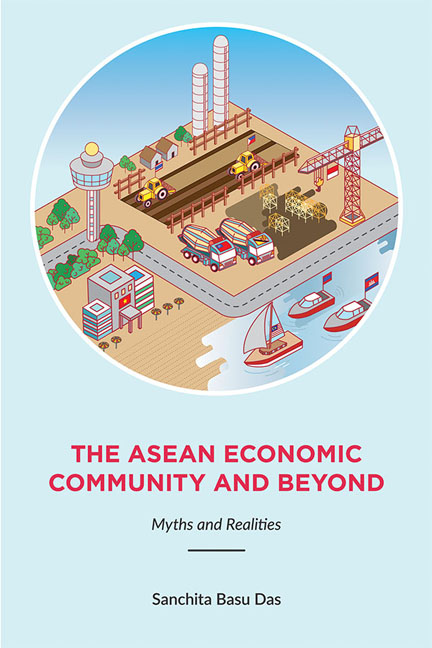Book contents
- Frontmatter
- Dedication
- Contents
- Foreword
- Acknowledgements
- Abbreviations
- 1 Introduction: The ASEAN Economic Community and Beyond
- I THE ASEAN ECONOMIC COMMUNITY (AEC)
- II BEYOND THE ASEAN ECONOMIC COMMUNITY
- III AN ASEAN PERSPECTIVE OF REGIONAL CONNECTIVITY
- 18 Promoting Asia's Infrastructure for Regional Trade and Investment
- 19 Addressing Infrastructure Financing in Asia
- 20 APEC and ASEAN Connectivity: Areas of Mutual Interest and Prospects of Cooperation
- 21 China's Three-pronged Strategy on Regional Connectivity
- 22 Can the China-led AIIB Support the ASEAN Connectivity Master Plan?
- Appendix: Summary of the Trans-pacific Partnership Agreement
- Index
- About the Author
22 - Can the China-led AIIB Support the ASEAN Connectivity Master Plan?
from III - AN ASEAN PERSPECTIVE OF REGIONAL CONNECTIVITY
Published online by Cambridge University Press: 19 May 2017
- Frontmatter
- Dedication
- Contents
- Foreword
- Acknowledgements
- Abbreviations
- 1 Introduction: The ASEAN Economic Community and Beyond
- I THE ASEAN ECONOMIC COMMUNITY (AEC)
- II BEYOND THE ASEAN ECONOMIC COMMUNITY
- III AN ASEAN PERSPECTIVE OF REGIONAL CONNECTIVITY
- 18 Promoting Asia's Infrastructure for Regional Trade and Investment
- 19 Addressing Infrastructure Financing in Asia
- 20 APEC and ASEAN Connectivity: Areas of Mutual Interest and Prospects of Cooperation
- 21 China's Three-pronged Strategy on Regional Connectivity
- 22 Can the China-led AIIB Support the ASEAN Connectivity Master Plan?
- Appendix: Summary of the Trans-pacific Partnership Agreement
- Index
- About the Author
Summary
Riding on the wave of connectivity discussions since 2009, China seized the moment with its Finance Ministry proposing the idea of the Asian Infrastructure Investment Bank (AIIB) in early 2013. In October 2014, twenty-one members from different parts of Asia signed a Memorandum of Understanding to establish the AIIB. As of now, AIIB has attracted expressions of interest from almost sixty countries. With the AIIB being launched within four years of the adoption of Master Plan of ASEAN Connectivity (MPAC), policymakers are beginning to ask how this new source of funding can be deployed to resolve some of ASEAN's financing needs. This paper argues that the AIIB may not provide a complete solution for the MPAC. This is because the AIIB is first and foremost an Asian bank, rather than one focussed on Southeast Asia and its membership ranges from countries in Asia to Europe and Latin America. It is highly likely that this regional development bank will have a pan-Asian coverage. However, to the extent AIIB is viewed as a tool to advance Chinese strategic interests, ASEAN countries should ensure that they maintain Chinese interest in the region. Currently, there are significant trade and investment relations between ASEAN and China, especially because ASEAN economies contribute to Chinese-oriented production networks. These should be further strengthened. In addition, any infrastructure project that can contribute to ASEAN economies’ linkage to China is likely to be viewed positively by the Chinese-led multilateral bank. Moreover, ASEAN countries should cooperate rather than compete with each other to attract AIIB financial support. As most MPAC projects belong to multiple ASEAN countries, the member countries should have a cooperative stance towards regional requirement. Even projects that are domestic in nature should be developed for regional benefits. This gives all the more reason for ASEAN to strengthen its collective decision-making processes in the near future to effectively manage China's interactions with the region.
INTRODUCTION: CHINA SEIZED THE MOMENT
An Asian Development Bank (ADB) study done in 2009 generated significant interest and discussion on the need for infrastructure financing in the Asian region. It stipulated that from 2010 to 2020, Asia would need US$8 trillion in national infrastructure and about US$290 billion in regional infrastructure to connect its economies to each other and the world (ADB and ADBI 2009).
- Type
- Chapter
- Information
- The ASEAN Economic Community and BeyondMyths and Realities, pp. 248 - 258Publisher: ISEAS–Yusof Ishak InstitutePrint publication year: 2015



